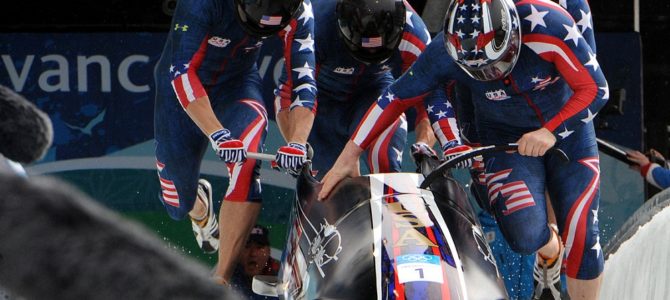
MY COUCH—Every two years, when the world’s best athletes celebrate what’s effectively parallel world championships for multiple sports, pundits try to make more of the Olympic Games than what they actually are. I get it, they have to attract clicks and remain relevant, but it’s the sports themselves that justify the billions spent on broadcast rights, not some Orwellian “war minus the shooting.”
Indeed, while there was real merit to viewing the Olympics through a political lens through much of the twentieth century, comparing Adolf Hitler’s 1936 pageant or the boycotts of the 1980s to the latest political flare-up is anachronistic. The “Miracle on Ice” had gravitas because an unsung group of hockey collegians beat the mighty Soviet professionals at the height of the Cold War. The “Miracurl on Ice,” meanwhile, was nothing more or less than an amazing comeback by a plucky band of Minnesota curlers (one of whom inexplicably looks like a Mario Brother), ultimately beating… friends from Sweden.
Sure, it looked like tensions on the Korean peninsula might overshadow the Pyeongchang Games, but Kim Jong-un agreed to send athletes at the last minute, including women hockey players who would compete jointly with their erstwhile compatriots. This apparent thaw was locally controversial—a viral rap video referred to the “Pyongyang Olympics”—but at least Pyongyang didn’t blow up an airliner after not getting to cohost, as happened ahead of the 1988 Seoul Games.
Tempests in the Olympics Teapot
Western journalists still managed to beclown themselves by fawning over Kim Yo-jong, the dictator’s sister and head propagandist—North Korea’s Goebbels, if you will. They also offered breathless coverage of the Hermit Kingdom’s cheerleaders, whose creepy synchronization hearkened to some Juche version of Stepford Wives. It seems that the media’s Trump Derangement Syndrome™ is such that Vice President Mike Pence’s policy of not having dinner alone with women is seen as worse than starving women and disappearing their families. But all that was just a phony war before any medals were contested.
The main scandal surrounding these games related to the weird quasi-punishment of Russia for a massive doping program of a kind not seen since East Germany’s pharmaceutical transgenderism. Russia the country was disqualified—with Vladimir Putin and his cronies disinvited—but athletes who had no previous violations and a consistent history of drug testing were allowed to compete under the Olympic flag as “Olympic Athletes from Russia” (fueling a social-media spike for alt-rockers O.A.R.). Still, two Russian athletes such nomads tested positive, one of them a curler!
I’ve also heard of overzealous enforcement of exclusive licenses and other commercial relationships, which is a recurring Olympic trope. Anecdotally, when a friend tried to post on Facebook video from an event she attended, it was blocked because the International Olympic Committee said that “it may contain content they [sic] own.” Come on, IOC, that’s so against the Olympic spirit (whatever that is).
In any case, despite the lack of world-historical drama, the 2018 games didn’t hurt for notable moments. Ester Ledecká of the Czech Republic won both the super-G skiing and parallel giant-slalom snowboarding, becoming the first winter olympian to strike gold in different sports at the same games. Jesse Diggins and Kikkan Randall won America’s first-ever cross-country skiing gold, in the women’s team sprint.
Another American, Elizabeth Swaney, secured Hungarian citizenship and attended numerous qualifying events to achieve her Olympic dream, which ended in a pedestrian half-pipe ski run that quickly went viral. (What do you call someone who finishes last at the Olympics? An Olympian.) And the German hockey team was 55 seconds away from beating Nickelback O.A.R. in hockey’s gold-medal match—the proto-Russians won in overtime—after having dispatched Sweden and Canada. To put that into context, it would be like the United States nearly winning the World Cup over Brazil after beating Germany and Italy en route.
The United States Did What We Do Best
While some poo-pooed the U.S. performance, using Swaney as a stand-in for “a familiar American type—a flim-flam artist, the corner-cutter, the oblivious striver,” it actually turned out to be a decent games for the red-white-and-blue. True, Norway got more medals than any country at any Winter Olympics ever, beating the United States’ record 2010 haul with half the number of competitors.
But the Americans got nine golds, just one shy of our record 2002 haul, and 23 total medals, more than in any Olympics before those Salt Lake City Games helped launch a growth in winter-sport interest. The speed skaters underperformed, but we did well at those X-Games sports that we invented to compensate.
Most importantly, unlike most other nations, the U.S. government doesn’t have a sports ministry and taxpayers don’t fund athletes. Instead, the U.S. Olympic Committee is a federally chartered nonprofit that generates revenue through sponsorships and donations. It has a very American pay-for-performance system, generally funding the sports where the U.S.O.C. can get the most bang for its bucks. In a large, rich country like ours, that also means filling out a large team, including plenty of folks who aren’t gonna medal.
Too many commentators try to inject some sort of existential meaning into the Olympics—when they’re not busy peddling utopian myths about the “Olympic movement.” International competitions of all kinds necessarily generate nationalism, but it’s generally of a benign kind where, for example, we can appreciate figure skaters formerly known as Russians even if we hope that Americans pull off the upset.
In short, everyone just needs to chill and enjoy the sports.









